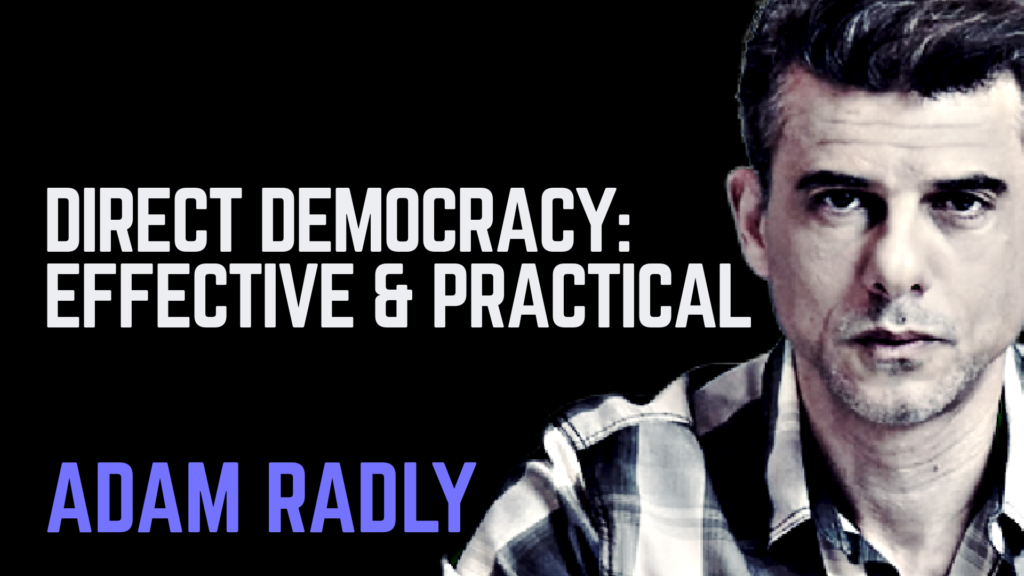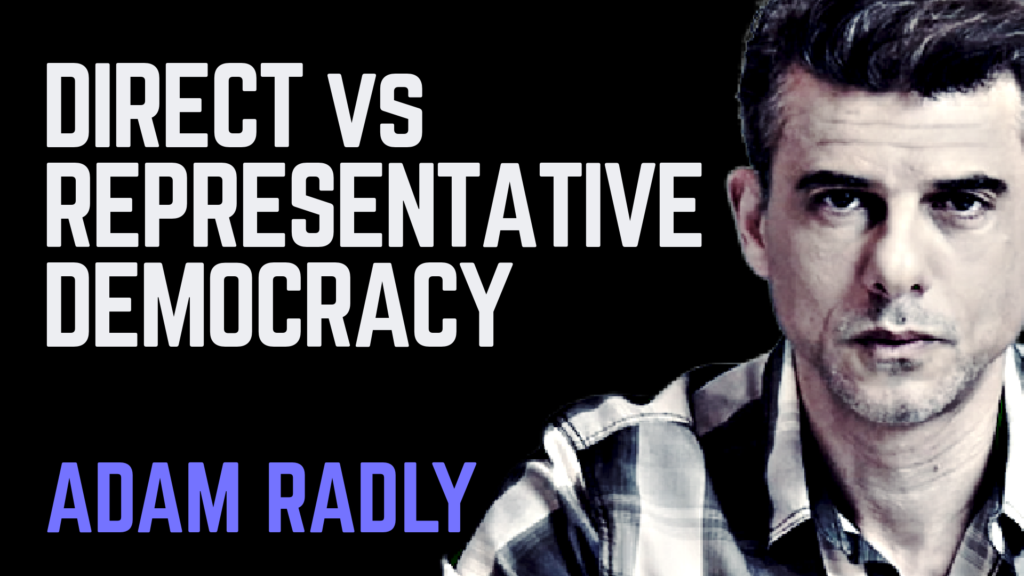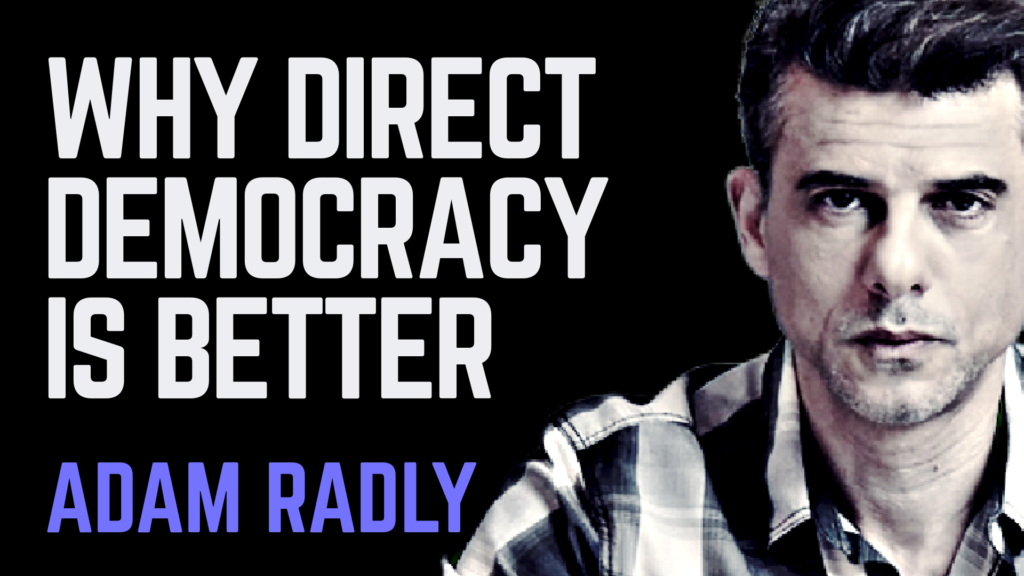How To Make Direct Democracy Effective & Practical: A Framework For Direct Democracy.
In order to make Direct Democracy effective and practical, we need a framework and the technology to manage it all. So, let’s get into it.
The Party: The starting point of Direct Democracy is a political party that allows the people to vote on issues directly. The Party will need to be registered in a local jurisdiction and plan to seek election to government in its jurisdiction.
Party Representatives: If a Party operates in multiple jurisdictions, humans are required to represent the Party in each individual jurisdiction. In a Representative Democracy, these party representatives will vote on behalf of the people so the people will only have power on election day and they will have no power during the term of government. In a Direct Democracy, the party representatives will just be administrators and vote according to the will of the people.
Registered Voter: A member of the community that meets the criteria set by local law for being allowed to vote.
Now let’s talk about the community can identify issues, develop ideas, and vote on them.
Ideas Listing: An Ideas Listing can be created by any member of the community by stating a problem that exists in the community and allowing other members of the community to contribute ideas for solving the problem. Users can also comment on ideas and upvote the best ideas.
Ideas listings have no formal or legal stature. They’re intended to allow the community to identify problems and develop ideas for solving them.
You can think of these listings as “community brain storming”.
It’s an opportunity for the community to learn more about problems and potential solutions before formally voting on anything.
If the community wants an Idea to become law or policy, a member of the community will need to create a Proposition. I’ll discuss Propositions in a minute.
Experts: In order for members do the community to make informed decisions they will need input from experts. Any members of the community can request Expert status.
If expert status is granted they will have an “e” next to their name when they participate in online discussions about any issue.
Convey a vote: Conveying a vote means allowing one member of the community to vote on behalf of other members of the community.
In order to make Direct Democracy more practical, members of the community can convey their vote (on any Proposition) to the Party leader, an Expert or another member of the community.
This gives every member of the community to the ability to vote directly on every issue or convey all of their votes for every issue or anything in between.
This effectively allows voters to participate as if it was a representative democracy – if this is what they want.
People that want the power and want to vote directly can have it and people that don’t want the power, and prefer to voluntarily delegate their power to a representative, can do it.
Everybody gets what they want. The rules that determine whether votes can be conveyed and how they can be conveyed are set by the Party.
Proposition: If the community has developed an idea for solving a problem and that they want to start the process of formally voting on it in order to make it a law or a policy, they need to create a Proposition.
A proposition is a proposal to address a specific issue in the community by voting for a specific solution. Any Registered Voter can create a Proposition.
Informal Proposition [“IP”]: All Propositions start as Informal Propositions by default – meaning that it will not become law or policy if it receives a majority of votes.
The purpose of an Informal Proposition is merely to identity the extent to which the community in interested in, or wants to support, the Proposition.
If the Informal Proposition gains a minimum number of votes (set by the Party) in support of the Proposition it will automatically convert to a Formal Proposition.
Formal proposition [“FP”]: A Formal Proposition will become law or policy if it is Approved by the majority of Registered Voters.
Approved Proposition (“AP”): A Formal Proposition that has won the majority of votes in favor of the Proposition.
Ratification: If a Formal Proposition has been Approved, a new law or policy will need to be written. The Party leader will provide guidance to the lawyers writing the law / policy.
The final version of the law or policy will need to be Ratified (or approved) by the Registered Voters in order to ensure that it matches the intent of the Approved Proposition.
Policy: An Approved and Ratified Proposition.
Leaders and representatives: When it comes to leaders and representatives, it’s pretty simple. Both leaders and representatives will be elected by the people.
In to make this framework customizable for any local jurisdiction or any local requirements, the Party can set its own voter rules. This is an example of some of the most important voter rules.
Voting
- What is the minimum number of votes required for an Informal Proposition to convert to a Formal Proposition?
- What is the minimum number of votes required for a Formal Proposition to become policy / law?
- What is the minimum number of votes required for a party leader (or representative) to be recalled?
- What is the minimum time frame for voting on all types of Propositions?
- Can users convey votes? Yes / No
- Who can users convey votes to? Anyone, experts, party leader, or some combination.
Experts
- Can any user can request Expert status? Yes / No.
- Expert status can be granted by the Party. If a user believes they are an expert but they have been denied expert status, they can post a Proposition requesting expert status from the community. This allows the community to override the Party. Again, the people always have control. In this case, what is the minimum votes required in order for this person to be granted Expert status?
Misinformation and inappropriate posts
- Will they be flagged only, flagged and moved to “Flagged Content” page that everybody can see, or will they just be deleted?
- In order to minimize spam and general noise in the community, what is the maximum number of Propositions that a Registered Voters can create per month?
There are many more options. These are just examples to give you an idea of what’s possible and how we can make DD effective and practical.



